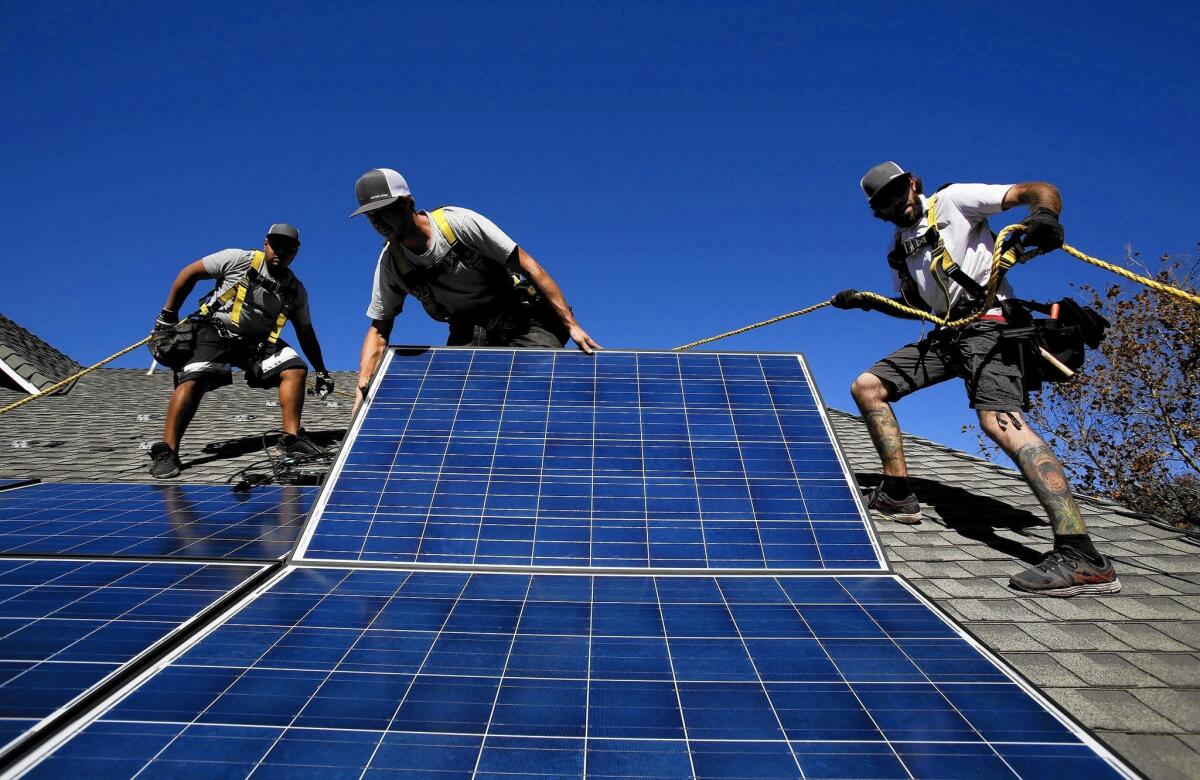Leased solar panels can complicate — or kill — a home sale

- Share via
Reporting from washington — Can going green by leasing solar panels for your roof cost you money — or give you headaches — when you go to sell the house?
Possibly both.
Say you get pitched by one of the growing number of companies offering solar panels at no upfront cost that they claim will save you lots of money on electricity bills. Sounds like a slam-dunk. So you sign on.
Then a few years later you decide to sell the house. You assume that the presence of solar panels can only be a marketing plus, maybe even get you a higher price. Everybody goes for green, right?
But that’s when it gets weird. Some would-be buyers balk when they learn that they’ll need to qualify on credit to take over your solar lease payments for the next 15 to 17 years. Others say they like the house but won’t sign a contract unless you buy out the remaining lease payment stream — $15,000 or $20,000 or more — because they’re worried that the solar equipment will become obsolete or won’t save as much on electricity bills as advertised.
Issues like these are popping up increasingly in California and other states and are interfering in sales and closings, according to real estate industry experts.
Consider what happened to Nora and Andrew Barber when they wanted to sell their home near Fresno. They needed to move because of an employment transfer to Thousand Oaks. Their house attracted offers quickly, but two successive sets of buyers backed out of contracts because of the leased solar panels on the roof. They either thought the long-term cost of the lease from Clean Power Finance was too high or got cold feet after hearing what credit qualifications they’d need to take over the lease.
Meanwhile, the Barbers were in the middle of negotiations to purchase their new house and making preparations to move.
“It was a nightmare,” Nora said. “We were in a panic” — pressured by the need to close the new purchase yet still dealing with unexpected complications caused by the leased panels. Finally, they paid $22,000 to get out of the lease and sold the house.
Steve Olszewski, senior vice president of operations for Clean Power, said that as a matter of policy, the company does not comment on cases involving its customers. He added that “we have seen very few instances” of home buyers “not wanting solar.” In 95% of cases, he said, buyers take over the solar agreement as-is or the home seller “pre-pays the agreement” or purchases the equipment outright.
Lynn Farris, a realty agent with Windermere Hulsey & Associates in Vacaville, Calif., says disputes arising over solar panel leases are “becoming an increasing problem” for sellers and buyers, and because of the rising popularity of solar, “it’s going to get worse.”
She has seen sales fall apart when the parties couldn’t agree on how to handle the substantial payments owed on long-term leases — in one case it was nearly $30,000 — or because buyers thought the leases “were really bad deals.” Out of four leased panel agreements she has analyzed, “only one was any good,” she said.
Nationwide, residential solar installations are booming — up by 50% per year since 2012, according to the Solar Energy Industries Assn. More than 600,000 homes and businesses now have on-site solar, with the fastest growth rates occurring in Maryland, Massachusetts and New York.
The biggest player in the field, SolarCity — backed by deep-pocket venture capital and chaired by Tesla Motors and SpaceX CEO Elon Musk — says it now has 190,000 customers in 16 states. Jonathan Bass, vice president of communications, says working out smooth transfers of leased systems from sellers to buyers — or buyouts of systems — is a priority. SolarCity has a 12-person team that already has arranged “close to 3,000” transfers, Bass said.
Takeaways from all this? Top of the list: Be aware of the potential complexities that can occur when you lease, rather than buy, solar panels.
If you opt for a lease, understand your long-term obligations, and talk to your current utility company about the savings claimed. Most important, if you’ve got a leased system and plan to sell, contact the leasing company well in advance to learn about the lease transfer and buyout options. That way you’ll be ready if prospective buyers have problems with your panels.
Distributed by Washington Post Writers Group.
More to Read
Sign up for Essential California
The most important California stories and recommendations in your inbox every morning.
You may occasionally receive promotional content from the Los Angeles Times.






